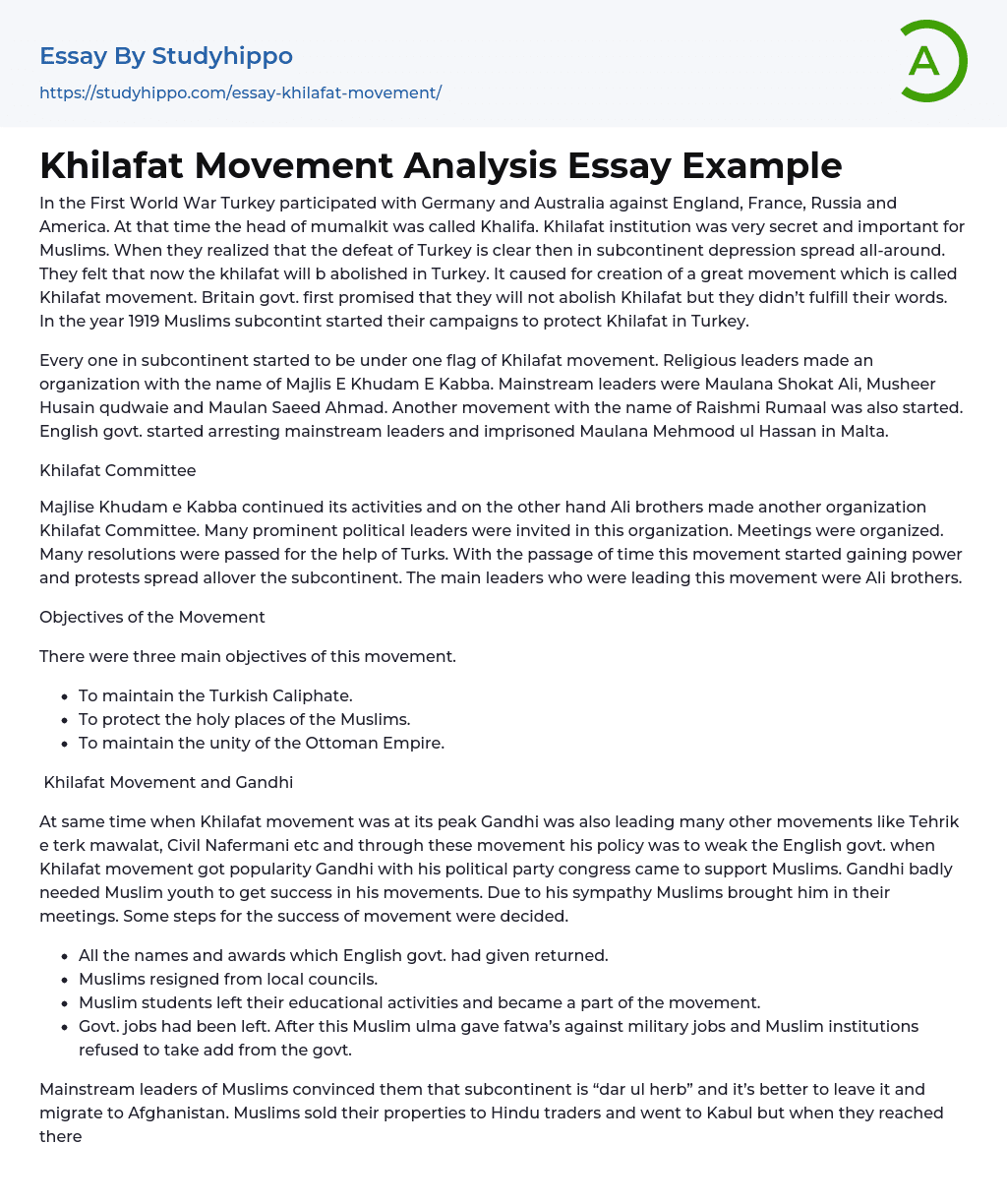In World War I, Turkey allied with Germany and Australia but opposed England, France, Russia, and America. The leader of mumalkit during this period was referred to as Khalifa. The Khilafat institution carried immense importance for Muslims and functioned with utmost secrecy.
The British government's actions sparked the Khilafat movement, a substantial response to concerns about Turkey losing the khilafat. As Turkey faced imminent defeat, despair spread throughout the subcontinent.
At first, it was promised that Khilafat would not be eliminated, but these assurances were not honored. In 1919, Muslims in the subcontinent initiated their endeavors to protect Khilafat in Turkey. All individuals within the subcontinent united under the Khilafat movement. An organization called Majlis E Khudam E Kabba was formed by religious figures. Prominent leaders such as Maulana Shokat Ali, Musheer Husain Qudwaie, and Maulana Saeed Ahmad played a key role.
Another movement called Raishmi
...Rumaal was also initiated by the English government, resulting in the arrest of mainstream leaders and the imprisonment of Maulana Mehmood ul Hassan in Malta.
Khilafat Committee
Majlise Khudam e Kabba continued its activities while Ali brothers established another organization, Khilafat Committee, inviting multiple prominent political leaders to attend organized meetings.
Many resolutions were passed for the help of Turks, and over time, this movement gained power and spread protests throughout the subcontinent. The main leaders of this movement were Ali brothers.
Objectives of the Movement
The movement had three main objectives: to maintain the Turkish Caliphate, protect the holy places of Muslims, and preserve the unity of the Ottoman Empire.
Khilafat Movement and Gandhi
During the peak of the Khilafat movement, Gandhi was also leading other movements such as Tehrik e terk mawalat and Civil Nafermani. Through these
movements, he aimed to weaken British government control.
The Khilafat movement gained popularity, and Gandhi, along with his political party congress, came to support the Muslims. Gandhi needed the support of Muslim youth for his movements, and Muslims sympathized with him and invited him to their meetings. Several steps were decided upon for the success of the movement:
- Returning all names and awards given by the English government.
- Muslims resigning from local councils.
- Muslim students ceasing their educational activities and joining the movement.
- Leaving government jobs. Following this, Muslim ulma issued fatwas against military jobs, and Muslim institutions refused government advertisements.
Mainstream Muslim leaders persuaded their followers that the Indian subcontinent is "dar ul herb" and it would be better to leave and migrate to Afghanistan. Muslims sold their properties to Hindu traders and traveled to Kabul. However, upon arrival, they encountered issues with the Afghan government.
Refusing to allow them, Gandhi caused Muslims to experience financial collapse. In 1919, the Ali brothers led a delegation for talks with authoritative persons of the English government in England, known as Wafad e Khilafat. The delegation, consisting of Musheer Hussain, Shoaib Qureshi, Syed Suleman Nidvi, and seven others, was headed by Maulana Muhammad Ali Johor.
In London, there was a lengthy discussion between P.M Jorje and representatives from Turkey. However, Jorje refused to make any concessions to Turkey. As a result, the British army entered Turkish cities and engaged in brutal killings.
Muslim News Papers
In the subcontinent, several newspapers such as Kamred, Hundred, and Zimindaar took
strong actions against the English government. The Lahore-based newspaper, Paisa Akhbar, campaigned vigorously. Consequently, these newspapers were banned.
Sewray Packet
The Allies made an agreement with Turkey. This agreement resulted in heavy penalties being imposed on Turkey.
Allies gained control of various territories, causing Turkey to lose control over all Arab regions. Hejaz e Muqadas was handed over to the Sharif of Makah, who supported the British against Turkey. Meanwhile, a movement led by Mustafa Kamal Pasha emerged in Turkey. Kamal Pasha rallied the Turkish army and expressed a determination to continue fighting against the allies.
- Child essays
- Childcare essays
- Child labor essays
- Doll essays
- Quran essays
- Al-Qaeda essays
- Muhammad essays
- Muslim essays
- Ali essays
- Ramadan essays
- Saudi Arabia essays
- Egypt essays
- Iran essays
- Iraq essays
- Israel essays
- Syria essays
- Adoption essays
- Aunt essays
- Babies essays
- Bedroom essays
- Caring essays
- Children essays
- Daughter essays
- Divorce essays
- Dog essays
- Dysfunctional Family essays
- Family Tradition essays
- Family Values essays
- Father essays
- Foster Care essays
- Friends essays
- Grandparent essays
- Home essays
- Hometown essays
- Husband essays
- Jealousy essays
- Love essays
- Marriage essays
- Mother essays
- Online Dating essays
- Parenting essays
- Parenting Teens essays
- Parents essays
- Relationship essays
- Room essays
- Sibling essays
- Sister essays
- Wedding essays
- Wife essays
- Afterlife essays




